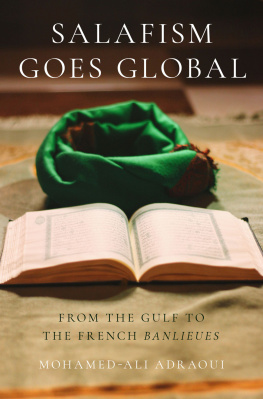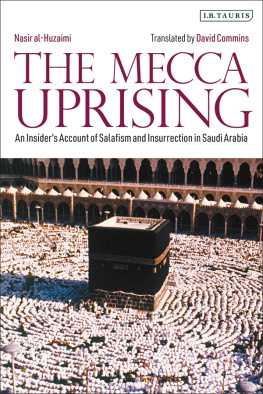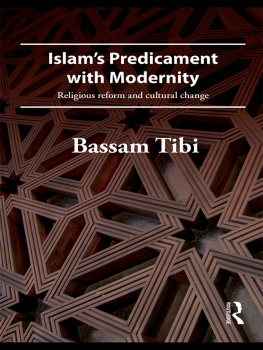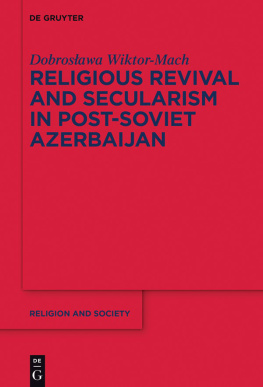Salafism Goes Global
RELIGION AND GLOBAL POLITICS
Series Editor
John L. Esposito
University Professor and Director
Prince Alwaleed Bin Talal Center for Muslim-Christian Understanding
Georgetown University
Piety and Politics
Islamism in Contemporary Malaysia
Joseph Chinyong Liow
Terror in The Land of the Holy Spirit
Guatemala under General Efrain Rios Montt, 19821983
Virginia Garrard-Burnett
In the House of War
Dutch Islam Observed
Sam Cherribi
Being Young and Muslim
New Cultural Politics in the Global South and North
Asef Bayat and Linda Herrera
Church, State, and Democracy In Expanding Europe
Lavinia Stan and Lucian Turcescu
The Headscarf Controversy
Secularism and Freedom of Religion
Hilal Elver
The House of Service
The Glen Movement and Islams Third Way
David Tittensor
Answering the Call
Popular Islamic Activism in Sadats Egypt
Abdullah Al-Arian
Mapping the Legal Boundaries of Belonging
Religion and Multiculturalism from Israel to Canada
Edited by Ren Provost
Religious Secularity
A Theological Challenge to the Islamic State
Naser Ghobadzadeh
The Middle Path of Moderation In Islam
The Qurnic Principle of Wasaiyyah
Mohammad Hashim Kamali
One Islam, Many Muslim Worlds
Spirituality, Identity, and Resistance Across Islamic Lands
Raymond William Baker
Containing Balkan Nationalism
Imperial Russia and Ottoman Christians (18561914)
Denis Vovchenko
Inside the Muslim Brotherhood
Religion, Identity, and Politics
Khalil al-Anani
Politicizing Islam
The Islamic Revival in France and India
Z. Fareen Parvez
Soviet and Muslim
The Institutionalization of Islam in Central Asia
Eren Tasar
Islam In Malaysia
An Entwined History
Khairudin Aljunied

Oxford University Press is a department of the University of Oxford. It furthers the Universitys objective of excellence in research, scholarship, and education by publishing worldwide. Oxford is a registered trade mark of Oxford University Press in the UK and certain other countries.
Published in the United States of America by Oxford University Press
198 Madison Avenue, New York, NY 10016, United States of America.
Oxford University Press 2020
All rights reserved. No part of this publication may be reproduced, stored in a retrieval system, or transmitted, in any form or by any means, without the prior permission in writing of Oxford University Press, or as expressly permitted by law, by license, or under terms agreed with the appropriate reproduction rights organization. Inquiries concerning reproduction outside the scope of the above should be sent to the Rights Department, Oxford University Press, at the address above.
You must not circulate this work in any other form and you must impose this same condition on any acquirer.
Library of Congress Cataloging-in-Publication Data
Names: Adraoui, Mohamed-Ali, author.
Title: Salafism goes global : from the Gulf to the French banlieues / Mohamed-Ali Adraoui.
Other titles: Du Golfe aux banlieues, le salafisme mondialise. English
Description: New York : Oxford University Press, 2020. |
Series: Religion and global politics | Includes bibliographical references and index. |
Translated from French.
Identifiers: LCCN 2019042375 (print) | LCCN 2019042376 (ebook) |
ISBN 9780190062460 (hardback) | ISBN 9780190062484 (epub) | ISBN 9780190062491 (online)
Subjects: LCSH: SalafiyahFrance. | IslamFrance. |
MuslimsFranceAttitudes.
Classification: LCC BP195.S18 A3513 2020 (print) | LCC BP195.S18 (ebook) |
DDC 297.8/1dc23
LC record available at https://lccn.loc.gov/2019042375
LC ebook record available at https://lccn.loc.gov/2019042376
Contents
Gilles Kepel
Gilles Kepel
More often than not, those who speak of Salafism know it only superficially, and they readily take offense at the monstrous appearance of this practice in contemporary Islam, buttressed by taking at face value the ritual and mimetic implementation of the Prophets teachings. The phenomenon appears all the more bewildering in the French context, inasmuch as its practicants are products of the Republics rationalist, secular schools. It reaches a fever pitch when it involves converts to Islam, often emerging from the suburban working class and socialized with a mostly Muslim youth. Here the Salafist commitment displays affinities with recruitment by sects laying claim to other beliefs but adopting similar paths: a break with the cultural background, resocialization, change of name, of dress and physical appearance, etc. Usually the distress of friends and relatives is extreme, as has been widely documented. Finally, although most Salafis stay away from politics and violent militancy and concentrate instead on proselytizing while vowing strict obedience to the great, mostly Saudi, Islamic scholars (or ulemas), and make of this interpretation of belief a church of sorts that is unknown in historical Sunni Islam, some individuals have gone beyond this engagement to cross over into jihad. The example of greatest concern in this regard is Mohammed Merah; since the drama that ensued after his crimes, he has cast a shadow over Islams recent history in France.
Between its roots in the working-class suburbs of Islam, where young people who have lost their bearings turn to an identity that corsets their faith and locks them in a citadel of certainties, and its signing onto the internet, where the fatwas of the Gulf ulemas circulate to circumscribe consciousness and feed dreams of emigrating from an impure France to leading a pure and heroic Islamic life, Salafism constitutes an extreme case of de-integration. It registers in opposition to the French national narrative, whose credo is the integration of immigrants. Not only is integration detested here, but we also have the detachment of a certain number of young people alienated from their home country and their inherited culture.
Mr. Adraouis rich study, conducted following numerous interviews in France, the Maghreb, Middle East, and Gulf, for the first time re-creates the complex journeys of Frances Salafis. It pays a great deal of attention to their social, economic, political, and religious dimensions, and it exposes many of the everyday contradictions. This is indispensable reading for anyone who wishes to analyze developments of Islam in France today and those who, day by day, must deal with the social problems in the working-class suburbs where Islams presence is crucial. This work makes a major contribution to the debate that promises to illuminate it decisively.
Gilles Kepel is a university professor at Sciences Po and a member of the Institut Universitaire de France.
This work draws on a doctoral thesis that I had the honor of writing and defending in 2011, supervised by Gilles Kepel and Catherine Withol de Wenden at Sciences Po in Paris. It would certainly not have seen the light of day had it not been for the sage counsel and patience of these two individuals, who have never spared their efforts when it comes to their students. I also benefited greatly from a research allowance from Sciences Pos Mediterranean Middle East Studies Chair, where brilliant specialists in the Muslim world have been educated and contributed to the renaissance of studies in this field.













